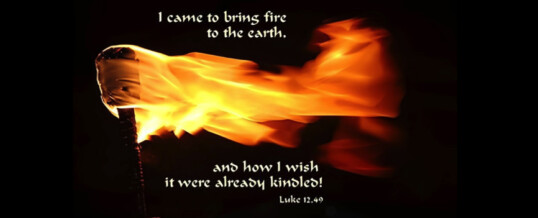
I have always believed this to be true of my life, and I suspect it’s true of everyone life—that whatever is good, worthwhile, and enduring came to us through hard work and sacrifice, either our own or the sacrifice of someone who came before us. Let’s of course not dismiss, for one moment, God’s grace which is always part of everything we do. Without hard work and sacrifice, we appreciate very little, and life becomes an easy-come-easy-go affair. Again, if you’re anything like me, you’ve probably had more cheerleaders on the sidelines encouraging you on than you’ve every acknowledged or thanked. “Cheerleaders” also go by the names: “witnesses” or “mentors”.
The Biblical prophets, as well as the prophets who still walk among us, are still needed by us and maybe more than ever. Jeremiah, whom we heard from in that first reading, was such a witness. Like all truly prophetic people, Jeremiah did not speak his own words but allowed his life to bear witness to God’s words. As good as teachers are, we have all been formed much more by witnesses or teachers who learned how to become witnesses. Witnesses beckon us to go to places we would never have the courage to go on our own. They speak truth to power and say, “You can, too.” They call out injustices they see around them and say, “You can, too.” They respond to a higher call than their own self-interest and say, “You can, too.”
Jeremiah, 600 years before the birth of Jesus, called the people of Judah to a truth, an “inconvenient” truth they did not want to hear. He spoke courageously God’s word, but that word was not received. Instead, as we heard, they threw him down a well hoping that if the messenger was no more the message also would be no more. Jeremiah warned the people to turn to God otherwise the Babylonians would invade and destroy Judah. They called him a traitor and a deserter because he advocated praying to God rather than taking up the sword. We are still quick to label people and throw them under the bus, or down a well, if they disagree with our plans. Thankfully, Jeremiah was rescued by a non-Jew named Ebed-melech who saw Jeremiah as someone who was bearing witness to God’s love in the world even from the bottom of a well. By the way, that is the primary vocation of every one of us—to bear witness to God’s love in the world. Of course, nobody bore witness to God’s love more perfectly than Jesus. He is, as that second reading said, the pioneer and perfecter of our faith. He gives you fair warning that if you follow him whole-heartedly, you can expect persecution, but rejoice because the kingdom of God is yours. Or, as St. Paul says, “All that we suffer in the present time is nothing in comparison with the glory that awaits us.”
Perhaps that is what motivated the Saints and all good witnesses before us—they simply saw something a little bit into the future that was worth the sacrifice and suffering of the present moment. When they tapped into their primary vocation of bearing witness to God’s love in the world, they were forming a great cloud of witnesses and inviting us into that cloud as well.
During his entire life, even while on the Cross, Jesus kept his eyes on the prize—the Kingdom of God. Where the kingdom is, you find the King—God. All Jesus ever wanted to do was to invite us into a relationship with God. He said, “I came to bring fire to the earth and how I wish it were already kindled!” Fire is code language for the presence of God. All Jesus desired was for the whole world to be engulfed in the presence of God and God’s love. When he spoke like this, people came down on one side of the fence or the other. They either accepted the invitation and allowed the fire of God’s love to lead them to greater conversion, or they violently rejected it. Even within households, people were divided father against son and mother against daughter. Jesus’ job was not to choose sides but to bear witness to God’s love even if we were at each others’ necks choosing our own side.
I love what the late Fr. Henri Nouwen once wrote about witnessing to our faith. In a book entitled, With Burning Hearts, he wrote: “Here we come to realize that mission is not only to go and tell others about the risen Lord, but also to receive that witness from those to whom we are sent. Often mission is thought of exclusively in terms of giving, but true mission is also receiving. If it is true that the Spirit of Jesus blows where it wants, there is no person who cannot give that Spirit. In the long run, mission is possible only when it is as much receiving as giving, as much being cared for as caring. We are sent to the sick, the dying, the handicapped, the prisoners, and the refugees to bring them the good new of the Lord’s resurrection. But we will soon be burned out if we cannot receive the Spirit of the Lord from those to whom we are sent.”In your life, who makes up the cloud of witnesses, the cheerleaders, who keep you moving forward in life, especially when life is difficult? Do you believe that you also form part of that cloud and that somebody is looking up to you at every moment of your life, including this moment? You are the kindling Jesus needs to set the world on fire.
Fr. Phil Mulligan
AUG
2022

About the Author: